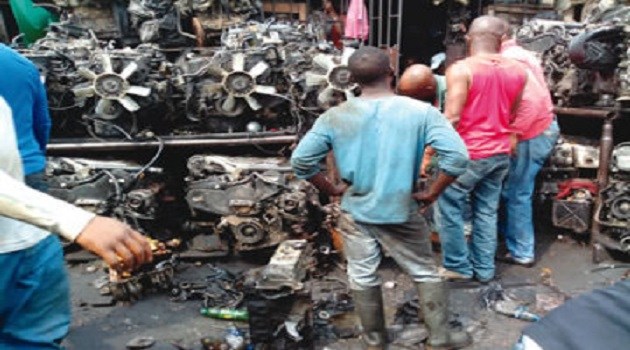Spare parts dealers at Abossey Okai have called on government to take steps to halt the cedi from further depreciation.
According to the spare parts dealers, they will have no other option but to increase the cost of their goods if the cedi is not stabilized against the dollar.
The cedi since January this year has seen about 2.4 percent depreciation reducing in value against the dollar from 4 cedis 90 pesewa to 5 cedis 20 pesewas.
The decline in the value of the currency is beginning to have a negative impact on traders, particularly importers.
In the second week of January this year, the cedi begun experiencing some depreciation.
Initially, some observers attributed the development to a slight increase in the demand for the dollar by importers who wanted to restock their wares after depleting their stock it during the festive season in December.
Read also: BoG rules out fixed exchange rate regime to check cedi fall
However, it appears the situation is far from ending. In the first week of February, the local currency was going for 5 cedis 10 pesewas.
In the second week in the same month, the cedi has lost 10 pesewas against the dollar going for 5 cedis 20 pesewas.
The Co-Chair of the Abossey Okai Spare Parts Dealers Association, Clement Boateng stated that the development will lead to an increase in prices of goods.
He maintains that traders will have no option but to force the increase in prices of vehicle parts on consumers.
“No importer is father Christmas†he said adding that “every businessman is operating to make profitâ€.
Analysis
The strength of the cedi has in recent times weakened again eight months after the currency depreciated by more than 2 percent in a short period.
The last time the cedi experienced this major depreciation over a short period of time was in May 2018.
At the time, the Governor of the Bank of Ghana Dr. Ernest Addison attributed the depreciation mainly to external factors particularly from the U.S which was said to have affected other currencies across the world.
increase in the demand for the dollar by importers to restock their wares after depleting their stock during the festive season in December.
The strength of the cedi against a major currency like the dollar gives an indication of things to happen in the economy very soon. Volatile exchange rate regime could cause price instability pushing inflation up. In addition, it indicates that Ghana’s imports are unmatched with goods exported since export is an inflow of foreign currencies
For now, the importers are of the view that there is no more time to waste in halting the free fall of the local currency.
www.primenewsghana.com/Â Credit: citifmonline
Â





